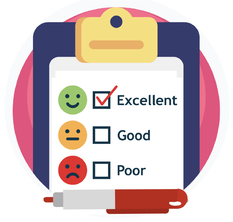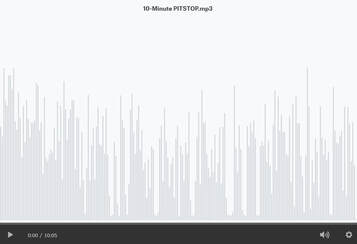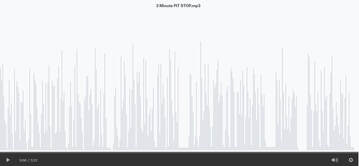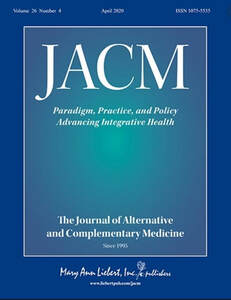Herein you will find some freely available resources and tools that we developed.
|
All material found here is under the copyright of Dr. David Victorson (and in the case of the Medical Student Stress Scale, Dr. Matthew Mosquera as well). You are welcome to download and use these as you wish at no cost.
We would love to receive any news about where and how these are being used if you don't mind. If you need to modify anything given your specific research needs, you are free to do so, however we request that you acknowledge any changes in your presentations and publications so that everyone may learn and benefit. At present we have no plans for translations into different languages beyond what is currently available and would welcome anything you are interested in doing. |
Resources
12-Minute General PIT STOP Training Video
|
The 12-minute PIT STOP educational video found here has been used to teach basics about the practice and benefits of mindfulness meditation, as well as a simple mnemonic for taking a self-care break from time to time: Pause, Inhale, Take note, of your Self, and the Task at hand, Observe where the mind may have wandered and gently bring it back, and Proceed when ready.
|
1-Page General PIT STOP Overview
|
The downloadable PDF to the left provides a 1-page overview of the PIT STOP and how it may be implemented into one's work or home environment.
| ||||||
10-Minute PIT STOP for Medical Professionals
3-Minute PIT STOP for the Clinical Patient Encounter
PIT STOP Publication
Scales
Antepartum Bedrest Emotional Impact Inventory (ABEII)
The ABEII is a brief assessment tool developed to measure bed rest-related psychosocial distress, which includes items dealing with anxiety, loneliness/isolation, boredom, depression, stress, and loss of control. You may reference the following publication when citing your use of this measure: Bauer, Victorson, Rosenbloom, Barocas, & Silver (2008).
Enacted Health Behaviors Scale
The Enacted Health Behaviors Questionnaire is a 10-item tool assessing everyday health habits related to diet, exercise, preventive healthcare, and psychosocial well-being. You may reference the following publication when citing your use of this measure: Murphy & Victorson (2019).
Injury Distress Index (IDI)
The IDI is a 32-item assessment tool examining injury-related distress, namely depression, anxiety, avoidance and numbing, hyperarousal, re-experiencing, post traumatic stress, and pain, after a traumatic physical injury. You may reference the following publication when citing your use of this measure: Victorson, Enders, Burnett & Ouellette (2008).
Injury Resilience Index (IRI)
The IRI is a 19-item assessment tool measuring aspects of resilience such as optimism, cognitive flexibility, hardiness, social support and resources, and coping self-efficacy in the context of recovering from a traumatic physical injury. You may reference the following publication when citing your use of this measure: Victorson, Burnett & Gela. Validation data are also available at: Victorson, Burnett & Gela.
Medical Student Stress Scale
The Medical Student Stress Scale is a 22-item tool assessing stress, which includes emotional distress, academic self-efficacy, interpersonal relationships with peers and faculty, and work/life balance, in the context of medical school attendance. For validation and psychometric information please see: https://pubmed.ncbi.nlm.nih.gov/33388065/.
A Spanish language version of the MSSS scale is also available here:
| eeem.pdf | |
| File Size: | 38 kb |
| File Type: | |
GRACE Scale: Gratitude, mindful Awareness, Compassion & Empathy
The GRACE Scale is a brief 6-item tool that measures ones intentions in gratitude, mindful awareness, empathy, and self-compassion.
Health Behavior Self-Efficacy Scale
The Health Behavior Self-Efficacy Scale is a 6-item tool assessing confidence in ones ability to engage in healthy everyday habits related to diet, exercise, use of alcohol and tobacco, and psychosocial well-being.
Treatment Decision Making Satisfaction Scale (TDM-SAT)
The TDM-SAT is a 6-item measure derived from patient interviews and focus groups which assesses retrospective satisfaction with treatment choice and the decision-making process. You may reference the following publication when citing your use of this measure: Victorson, Schuette, Schalet, Kundu, Helfand, Novakovic, Sufrin, McGuire & Brendler (2016).
Surveys
Intervention Course Satisfaction
The Intervention Course Satisfaction questionnaire is an 11-item evaluation of participant satisfaction their overall experience in a behavioral research intervention, which includes motivation, expectations, and feasibility of meeting requirements (e.g. attendance).
Intervention Instructor Evaluation
The Intervention Instructor Evaluation is a 14-item measure of participant satisfaction with an intervention instructor's overall effectiveness in presenting material and responding to participants.
Meditation History Questionnaire
The Meditation History Questionnaire is a 5-item tool assessing the extent of individual's experiences with meditation.
Mindfulness Intervention Satisfaction Survey
The Mindfulness Intervention Satisfaction Survey is a 22-item evaluation of participant satisfaction with their overall experience in a mindful meditation intervention, including perceived mindfulness-related benefits, and feasibility of meeting course expectations (e.g. attendance and home practice).






